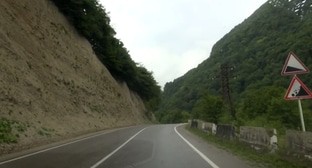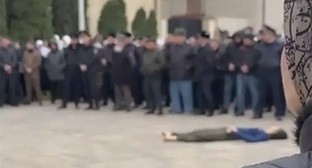15 December 2014, 09:00
Week in the Caucasus: review of main events of December 8-14
Burned down houses of militants' relatives in Chechnya; condemnation by Russian rights defenders of principle of collective responsibility, and the subsequent incidents with them in Grozny; end of hunger strike in Dagestan demanding to restore Tarki District; Geneva discussions on safety in Southern Caucasus; attacks on oppositionactivists in Armenia; next humanitarian convoy from Russia to Donbas; special operations in Dagestan and Kabardino-Balkaria, during which nine suspected militants were killed, – see the review of these and other events in the Caucasus during the week of December 8-14, 2014, prepared by the "Caucasian Knot".
Fires in houses of militants' relatives in Chechnya; criticism by rights defenders of principle of collective responsibility and subsequent incidents with them in Grozny
In Chechnya, after the December 4 militants' attack on Grozny, power agents began burning down houses of relatives of members of the armed underground. Activists of human rights organizations expressed concern in this regard; and employees of one of such organization in Grozny became objects of law enforcers' attention.
On December 5, the head of Chechnya Ramzan Kadyrov said about the introduction of the principle of collective responsibility for families of members of the armed underground. Kadyrov said that militants' relatives would be expelled from the republic; and their houses would be demolished. On December 9 and 10, local residents told the "Caucasian Knot" that in the village of Yandi, Achkhoi-Martan District, power agents had burned down three houses inhabited by relatives of the militants killed on December 4 in Grozny; and in the village of Kotar-Yurt, a house was burned down belonging to the family of Aslan Byutukaev, who was considered by power agents to be the head of the suicide battalion "Riyad al-Saliheen". According to the Human Rights Centre (HRC) "Memorial", on December 6-7, in Chechnya, a total of six houses of militants' relatives were burned down, some of whom had been identified by relatives among those killed in the attack on Grozny.
Igor Kalyapin, the head of the Committee against Torture (CaT), demanded, in his appeals to the leaders of the Russian General Prosecutor's Office (GPO) and the Investigating Committee of the Russian Federation (ICRF), to check the Kadyrov's introduction of the principle of collective responsibility of families of members of the armed underground for compliance with the Russian legislation; and at a press conference at the Independent Press Centre in Moscow rights defenders expressed the opinion that the initiative of punishing militants' families will promote the ranks of underground fighters in Chechnya.
The response to the above human rights actions was another Ramzan Kadyrov's statement – about the need to check a man named Kalyapin for his involvement in organizing the attack on Grozny on December 4, as well as the appearance at a rally against terrorism on December 13 in the Chechen capital of the poster with the inscription "Kalyapin, go Home!" On the same evening, the staff of the Joint Mobile Group (JMG) of the CaT in Grozny reported that on their way to meeting with reporters at the hotel "Grozny City" they were pursued by unidentified armed men. Later, it was reported about a fire in the apartment housing the JMG office. The fire was liquidated; there were no casualties; however, the office with the JMG's documentation had burned out completely.
On December 14, the CaT reported that in Grozny, during a search, policemen detained Sergey Babinets and Dmitry Dmitriev, the lawyers of the CaT, who were planning to leave Chechnya. Later, the lawyers were released, but their mobile phones, cameras and laptops were confiscated. In their turn, Chechen law enforcers reject the statements about the incident with the rights defenders of the JMG and state their attempts to organize a provocation. As stated by Mikhail Fedotov, the head of the Presidential Council on Human Rights, there is some misunderstanding between the authorities of the Chechen Republic and the CaT; he noted his council is working towards eliminating this misunderstanding and setting up the dialogue.
Hunger strike demanding to restore Tarki District stopped in Dagestan
On December 8, it became known about the termination of the hunger strike, which was held by residents of Tarki villagers in the locality of Karaman (Black Stones) near Makhachkala. The hunger-strikers demanded to restore the Tarki District in Dagestan with inclusion of Karaman and Mount Tarki-Tau into its territory. Starting November 10, the protesters were hunger-striking in shifts. The decision to end the hunger strike and switch over to other forms of peaceful protest was made on December 7 at the expanded assembly of activists of the villages of Tarki, Kyakhulay and Alburikent. The hunger strike of Tarki nationals in Karaman can be considered a success, since it attracted the attention of the authorities to the land conflicts in the region, as well as to the associated problems of corruption, said the Dagestani experts questioned by the "Caucasian Knot" correspondent.
Geneva discussions, where Georgia raises issue of Russian-Abkhazian treaty; and Russia – of plans of creating NATO infrastructure in Georgia
The 30th round of Geneva consultations on security and stability in Transcaucasia (Southern Caucasus) was held on December 9-10. The first day covered informational meetings; the second day – the basic negotiations as such. Russia tried to bring the NATO topic to the negotiations, arguing that the plans to create a NATO's military infrastructure in Georgia and a possibility to supply new armaments to Georgia demand careful attention, because they touch on the security issues in the region. However, the Georgian party refused to discuss the NATO topic, saying that the debate format is not suitable for this purpose.
At the same time, the Georgian delegation raised the issue of negative results of the strategic partnership and alliance treaty, signed by Russia and Abkhazia. The Russian party expressed doubt whether it was reasonable for Georgia to raise the issue in the course of the consultations, because "this topic is not new." The discussions also dealt with humanitarian issues, in particular, problems with missing citizens of South Ossetia.
Attacks on opposition activists in Armenia
Last week, two oppositionists were beaten up in Armenia. On December 11, Aram Manukyan, the secretary of the parliamentary faction of the oppositional Armenian National Congress (ANC), was attacked near his house. A forensic examination found that he had a brain concussion. ANC spokespersons associated the attack on Aram Manukyan with his political activities; while the police announced the arrest of a suspect, but did not specify any possible motives for beating up the politician.
On December 12, information appeared about the beating by unidentified persons of Ashot Piliposyan, the head of the Razdan Branch of the ANC, who was hospitalized to the surgical ward of the local hospital. Doctors diagnosed a brain concussion and bruised chest. The police said they had established suspects in the attack on Piliposyan, who testified that they had conflict with the oppositionist on the basis of personal disagreements. However, the victim and his supporters see political motives in the incident.
Ninth motor convoy brings humanitarian aid from Russia to Donbas
Last week, a convoy of more than 130 trucks travelled across the Rostov Region and delivered humanitarian aid to the eastern regions of Ukraine, where, contrary to the will of the official Kiev, the independence of the Donetsk and Lugansk People's Republic was declared. On December 9, the motor convoy left Noginsk near Moscow, and on November 10, in the Rostov Region, it was united into a single column with the trucks from other regions of Russia; and on December 12, more than 1200 tons of humanitarian freights arrived in Donetsk and Lugansk.
According to the Russian party, the trucks were inspected by employees of the frontier and customs services of Ukraine and officials of the OSCE mission. However, as stated by Ukrainian State Border Service, since no officials of the International Committee of the Red Cross (ICRC) took part in accompanying the freights, the Ukrainian border guards conducted only a visual inspection over the transit of Russian freights across the border, without performing their due supervisory functions. It was the ninth convoy delivered from Russia to Donbas; earlier the Ukrainian party stated the illegality of such shipments.
Nine suspected militants killed in two special operations in Dagestan and Kabardino-Balkaria
Last week, two major special operations were conducted in Dagestan and Kabardino-Balkaria. In the morning on December 11, in Nalchik, in the area adjacent to the Frontier Department of the FSB, the counterterrorist operation (CTO) regime was introduced. As a result of the special operation, five-storey building was blocked, and four suspected militants were killed. A fire burst out in the building, which was later extinguished. As stated by power agents, one of those killed was identified; others can be identified only with the help of a special examination, since their bodies were badly burned. At the same time, as stated by the operative headquarters of the Russian National Antiterrorist Committee (NAC), the militants killed in Nalchik had been preparing a terror act in the territory of the above Frontier Department.
On December 12, Dagestani power agents conducted a special operation in the village of Gurbuki, Karabudakhkent District of Dagestan. Five suspected militants were killed; the official identification of them is also complicated by the fact that bodies are badly burned. However, according to power agents the leader of one of the militant groupings was killed in the course of the special operation. One of those killed was a woman; while two other women with children were released from the blocked house in the course of negotiations.





Комментирование через Кавказский узел